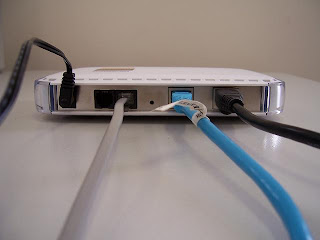At whatever level the
broadband bandwidth you use, it certainly makes sense to optimize the amount
you’re paying for. While there are many reasons that the full potential of
available broadband is not being achieved, one of the most obvious potential
choke-points is the modem. As the interface between your system and the great,
big outside world, it’s the key to efficient data transfer.
The
majority of family and small business subscribers lease a modem from their
Internet Service Provider (ISP). Moreover, once the modem they receive from
their ISP is hooked up and working, it tends to be forgotten: Just a small box
with blinking lights tucked away in a corner of the home or office. As the
number of devices and applications used over that modem increases, however, the
amount of available bandwidth begins to appear to become inadequate. One of the
first impulses (aside from bad language) is to contract with the ISP for more.
And, why not? More is always better. (This explains why people own
40hp riding mowing tractors, even if their lawn is the size of a parking
space.)
If
you are at the point where you feel the need for more speed, before – or as –
you contract with your ISP for greater broadband speed, it’s a good time to
consider your modem. Having a modem that is sufficient to your needs is just
as, if not more, important as having the devices and software.
The
first thing to determine is if you are leasing the modem, or if your actually
purchased it as part of the original contract with your ISP. It’s easy to
forget, but just as easy to find out: Contact your ISP. While you’re at it,
find out if the model you are currently using is the newest they have in their
inventory. If not, they’ll almost certainly be willing to sell or lease their
most up-to-date model; it’s in their interest both to keep you satisfied and to
provide additional revenue for their company. Before you commit, get the model
of the modem they may be suggesting for trade-in. If you already have the best
they have, confirm the model of that.
At
this point, consider the pros and cons of leasing from the ISP or purchasing
one on your own. A leasing contract usually requires that the ISP support the
modem, including maintenance, repair and upgrade. Even if your purchased from
them, they will almost certainly support the modem, although whether a fee is
attached is something you’ll have to find out. On the other hand, ISPs are less
likely to provide top-of-the-line modems for their subscribers. They do want to
provide modems that are sufficient to the task – to do otherwise would make
subscribers very sad – but price (their price) is also a major factor in their
decision of which model to adopt.
Once
you know your options with your ISP, it’s time to go window shopping (or
whatever OS you use). There are lots of models available, but you’ll quickly
focus on the ones that both fit your needs and are within your price range.
Consider speed, capacity, configuration, software (particularly the QOS Packet
Scheduler), compatibility with your particular set-up, compatibility with your
ISP’s system and the manufacturer’s reputation for making a good, robust
product. You will not be shocked to find out that there will be lots of
opinions for each model you’re considering posted on the internet. Treat these
opinions as you would normally when making any other decision. Whatever you
decide, you will certainly have a much wider range of options open to you than
are available from your ISP.
The
cons of owning a modem purchased outside the ISP’s supply chain are that you
will be solely responsible for its installation, upkeep and, if necessary,
replacement. In the end, only you can decide if that is an acceptable trade-off
for the independent choice and control you gain from buying your own model.
In
the end, the decision to continue to lease or to buy your own modem is not the most
earth-shattering decision you’ll ever make. Depending upon how much you depend
upon fast, dependable broadband access for work and play, it will have some
effect on you. At least considering the option of lease or buy will place you
in a smaller group of broadband users who have taken the step to take more
personal control over their broadband environment.















0 comments:
Post a Comment